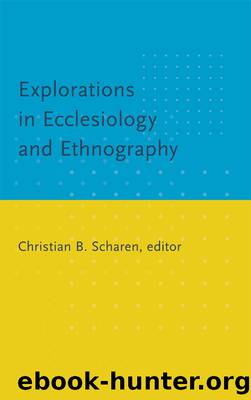Explorations in Ecclesiology and Ethnography by Scharen Christian B.;

Author:Scharen, Christian B.;
Language: eng
Format: epub
Publisher: William B. Eerdmans Publishing Company
Analysis: Secular Liturgies, Congregational Practices, and Geographical Habits
A key finding here is that when suburban evangelicals discuss the city, they do so without theological reference. In contrast, urban evangelicals tend to reference the city in positive theological terms â in some ways, they actually sound like they have more in common with urban mainline attenders than their fellow evangelicals. And it is also important to remember that on a national scale, urban evangelicals are a significant minority: less than 20 percent of all white evangelicals. In other words, urban evangelicals often talk like âconvertsâ: they have had to reflect on place and their relation to cities in ways that have forced articulation. In contrast, suburban evangelicals have tended to âgo with the flow,â as it were; they have not thought about place and thus are more easily shaped and directed by status quo habit-forming practices.
From our ethnographic case study, it seems plausible to assume that at least part of the white evangelical proclivity for the suburbs has roots in theological nonreflection. That is, choices about geographic habits are rarely brought under any type of theological interrogation; in other words, they might not be âchoicesâ at all, but rather the sort of automatic outcomes of habits acquired through practices that operate below the radar of reflection. In short, many evangelicals â like many Americans more generally â fail to think critically about geography and location. In an echo of Emerson and Smithâs argument regarding race, we see from these interviews that evangelical spirituality also has deep ramifications for attitudes regarding the city and geographical choices and habits.
This is instructive for the larger issue we are considering, namely, the adequacy of certain sociological methodologies for making sense of congregations and American religion. If actions are shaped and directed by rather âautomatedâ habits and practices, then we might have lower expectations about what typical social-scientific instruments can tell us. There will be distinct limits to surveys and interviews precisely because they expect articulation, whereas the practices that significantly drive behavior carry implicit, unarticulated orientations to place. Further research on these themes, then, would have to pioneer an ethnography that carefully âreadsâ the practices of evangelical worship, as well as other suburban âsecular liturgies,â in order to determine how our orientation to place, especially cities, is shaped and primed. And such work would require important partnerships between ecclesiology and ethnography to properly understand contemporary religious phenomena.
Download
This site does not store any files on its server. We only index and link to content provided by other sites. Please contact the content providers to delete copyright contents if any and email us, we'll remove relevant links or contents immediately.
Fangirl by Rainbow Rowell(7891)
How to Bang a Billionaire by Alexis Hall(7451)
Wonder by R. J. Palacio(7122)
The Space Between by Michelle L. Teichman(6130)
The Thirst by Nesbo Jo(5833)
Assassin’s Fate by Robin Hobb(5287)
Wiseguy by Nicholas Pileggi(4647)
The Kite Runner by Khaled Hosseini(4524)
The Night Circus by Erin Morgenstern(4468)
Bittersweet (True North #1) by Sarina Bowen(4360)
Paper Towns by Green John(4206)
Gerald's Game by Stephen King(3960)
Too Much and Not the Mood by Durga Chew-Bose(3718)
Pillow Thoughts by Courtney Peppernell(3473)
Twelve Days of Christmas by Debbie Macomber(3054)
Goodbye Paradise(3016)
Good by S. Walden(2940)
The Rosie Effect by Graeme Simsion(2742)
After We Fell by Anna Todd(2675)
